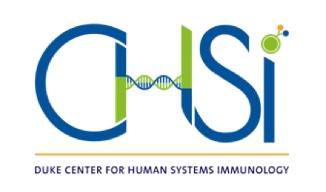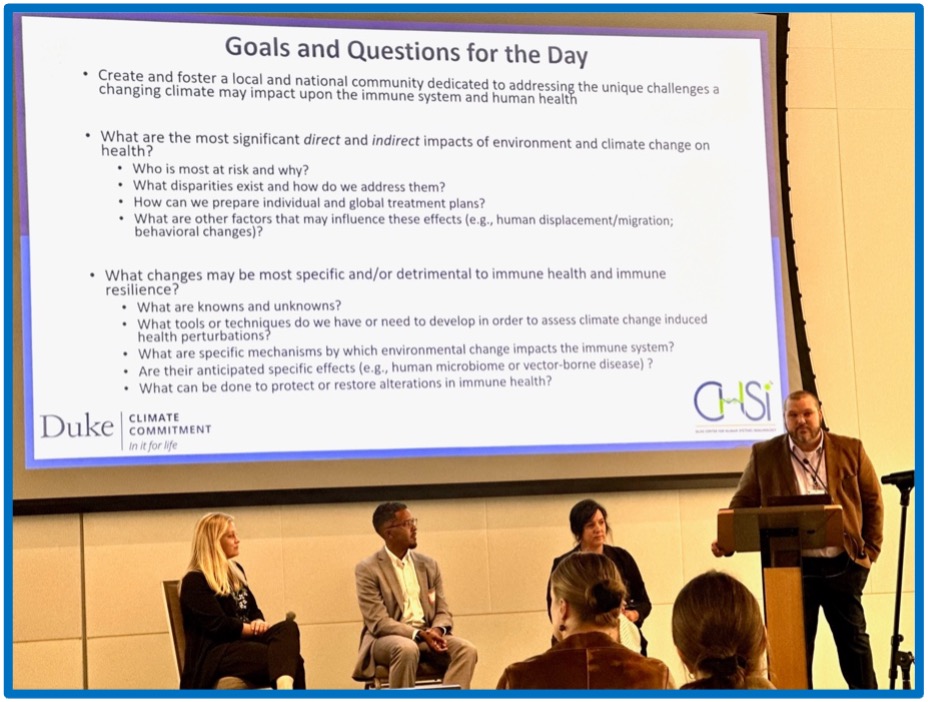CHSI Climate Change and Immune Health Mini-Symposium

Anthropogenic climate change resulting in rising temperatures and increased extreme weather events pose significant risks to global public health such as water-, food-, and vector-borne diseases, flooding, and pollutant exposure. These affect the human immune system in complex ways, presenting unparalleled health challenges which demand interdisciplinary collaborations for innovative solutions.
On June 05th, the inaugural “Climate Change and Immune Health Mini-Symposium,” organized by the Center for Human Systems Immunology (CHSI) and the Duke Climate Commitment, brought together cross-disciplinary investigators of all stages in an effort to explore interconnections between climate change and immune health. Hosted at Penn Pavilion, this event provided a new platform to exchange data, discuss emerging research, and propose actionable solutions. Supported by generous funding from the National Institutes of Health (NIH), the symposium highlighted critical areas of study, including the contribution of environmental risk factors on autoimmune diseases, social and geographic impacts on health outcomes, and the effects of air pollution on immune health.

The event commenced with a welcome from one of the CHSI Directors, Dr. R. Keith Reeves, followed by a talk from Dr. Brian Murray, Director of the Nicholas Institute for Energy Environment and Sustainability. These opening statements affirmed our institutions’ priorities of understanding human immune resilience, i.e., the ability of the immune response to adapt to the extrinsic and intrinsic conditions at hand and recover from them, and reiterated our shared pledge to improving health outcomes in the face of changing climate. Platform presentations began with a keynote address by Dr. Frederick Miller, NIH Scientist Emeritus and Former Chief of the Environmental Autoimmunity Group, NIEHS. Dr. Miller emphasized the roles of environmental risk factors in the increasing prevalence of autoimmunity and autoimmune diseases. His presentation set the stage for the subsequent sessions, which showcased cutting-edge research and multidisciplinary collaborations.
Experts from various fields presented their latest findings during the sessions, engaging the audience with their groundbreaking studies. Dr. Jamie DeWitt, professor of Pharmacology and Toxicology at East Carolina University, discussed her team's research on the impact of environmental factors on immunosuppression. Dr. Nrupen Bhavsar, Associate Professor at the Duke Departments of Surgery and Biostatistics & Bioinformatics, shared compelling research that explored the social and geographic impacts on health outcomes. Dr. Mercedes Bravo, Assistant Research Professor of Global Health and Associate Director for Equity, Inclusion and Diversity at Duke’s Global Health Institute, presented her findings on the mechanisms through which air pollution can compromise immune function. Dr. Julia Kravchenko, Assistant Professor in the Departments of Surgery and Population Health Sciences, detailed her research regarding the impact of exposure to environmental contaminants on Alzheimer’s disease and immune health. Finally, Dr. Ashley Ward, Senior Policy Associate at the Nicholas Institute, gave an excellent talk primarily focusing on the relationship between maternal-fetal health and the environment. A common thread between all these presentations was the disproportionate burden of climate change on the immune resilience of vulnerable communities, which underscored the urgent need for equitable solutions.

The culmination of the symposium was a thought-provoking moderated discussion on the collective responsibility of scientists to address these pressing issues. Esteemed panelists Drs. Kate Hoffman, A-Andrew Jones, and Ashley Ward led the engaging conversation. Speakers and audience members alike emphasized the importance of advocacy, policy changes, and interdisciplinary collaborations to address the challenges posed by climate change.
A post-event survey sent to speakers and attendees revealed a highly positive response to the symposium, with an overwhelming majority of respondents expressing satisfaction and indicating that they gained knowledge applicable to their research. The symposium was successful in establishing new connections for potential collaborations, and respondents expressed interest in future Climate Change and Immune Health working groups or funding opportunities. Crucially, respondents suggested expanding the focus of future symposia to include research areas such as parasitic diseases, mental health, types of climate change, and resilient responders.
The Climate Change and Immune Health Mini-Symposium exemplified Duke University's commitment to leveraging scientific expertise and CHSI’s commitment to human health and immunology, laying a foundation for future CHSI endeavors in this vital field of study. Overall, the symposium was a resounding success, attracting a diverse audience of roughly 75 immunology and climate scientists, socio-behavioral researchers, and trainees. It served as a powerful platform for exchanging research, fostering meaningful connections, and exploring actionable solutions to bridge the gap between science and advocacy. The event also underscored the critical need for sustained funding and policy discussions to address the adverse impact of climate change on immune health by developing and implementing innovative solutions. With the collective efforts of researchers, policymakers, and the community at large, we can strive towards a healthier, more resilient future for all.